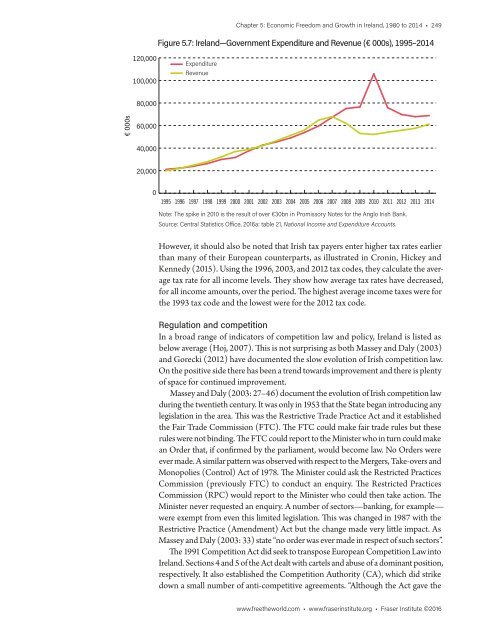Economic Freedom of the World
economic-freedom-of-the-world-2016
economic-freedom-of-the-world-2016
Create successful ePaper yourself
Turn your PDF publications into a flip-book with our unique Google optimized e-Paper software.
Chapter 5: <strong>Economic</strong> <strong>Freedom</strong> and Growth in Ireland, 1980 to 2014 • 249<br />
Figure 5.7: Ireland—Government Expenditure and Revenue (€ 000s), 1995–2014<br />
120,000<br />
100,000<br />
Expenditure<br />
Revenue<br />
80,000<br />
€ 000s<br />
60,000<br />
40,000<br />
20,000<br />
0<br />
1995 1996 1997 1998 1999 2000 2001 2002 2003 2004 2005 2006 2007 2008 2009 2010 2011 2012<br />
Note: The spike in 2010 is <strong>the</strong> result <strong>of</strong> over €30bn in Promissory Notes for <strong>the</strong> Anglo Irish Bank.<br />
Source: Central Statistics Office, 2016a: table 21, National Income and Expenditure Accounts.<br />
2013<br />
2014<br />
However, it should also be noted that Irish tax payers enter higher tax rates earlier<br />
than many <strong>of</strong> <strong>the</strong>ir European counterparts, as illustrated in Cronin, Hickey and<br />
Kennedy (2015). Using <strong>the</strong> 1996, 2003, and 2012 tax codes, <strong>the</strong>y calculate <strong>the</strong> average<br />
tax rate for all income levels. They show how average tax rates have decreased,<br />
for all income amounts, over <strong>the</strong> period. The highest average income taxes were for<br />
<strong>the</strong> 1993 tax code and <strong>the</strong> lowest were for <strong>the</strong> 2012 tax code.<br />
Regulation and competition<br />
In a broad range <strong>of</strong> indicators <strong>of</strong> competition law and policy, Ireland is listed as<br />
below average (Hoj, 2007). This is not surprising as both Massey and Daly (2003)<br />
and Gorecki (2012) have documented <strong>the</strong> slow evolution <strong>of</strong> Irish competition law.<br />
On <strong>the</strong> positive side <strong>the</strong>re has been a trend towards improvement and <strong>the</strong>re is plenty<br />
<strong>of</strong> space for continued improvement.<br />
Massey and Daly (2003: 27–46) document <strong>the</strong> evolution <strong>of</strong> Irish competition law<br />
during <strong>the</strong> twentieth century. It was only in 1953 that <strong>the</strong> State began introducing any<br />
legislation in <strong>the</strong> area. This was <strong>the</strong> Restrictive Trade Practice Act and it established<br />
<strong>the</strong> Fair Trade Commission (FTC). The FTC could make fair trade rules but <strong>the</strong>se<br />
rules were not binding. The FTC could report to <strong>the</strong> Minister who in turn could make<br />
an Order that, if confirmed by <strong>the</strong> parliament, would become law. No Orders were<br />
ever made. A similar pattern was observed with respect to <strong>the</strong> Mergers, Take-overs and<br />
Monopolies (Control) Act <strong>of</strong> 1978. The Minister could ask <strong>the</strong> Restricted Practices<br />
Commission (previously FTC) to conduct an enquiry. The Restricted Practices<br />
Commission (RPC) would report to <strong>the</strong> Minister who could <strong>the</strong>n take action. The<br />
Minister never requested an enquiry. A number <strong>of</strong> sectors—banking, for example—<br />
were exempt from even this limited legislation. This was changed in 1987 with <strong>the</strong><br />
Restrictive Practice (Amendment) Act but <strong>the</strong> change made very little impact. As<br />
Massey and Daly (2003: 33) state “no order was ever made in respect <strong>of</strong> such sectors”.<br />
The 1991 Competition Act did seek to transpose European Competition Law into<br />
Ireland. Sections 4 and 5 <strong>of</strong> <strong>the</strong> Act dealt with cartels and abuse <strong>of</strong> a dominant position,<br />
respectively. It also established <strong>the</strong> Competition Authority (CA), which did strike<br />
down a small number <strong>of</strong> anti-competitive agreements. “Although <strong>the</strong> Act gave <strong>the</strong><br />
www.free<strong>the</strong>world.com • www.fraserinstitute.org • Fraser Institute ©2016


